Rencontres 2016 – Underground Cities, Living Below the Surface
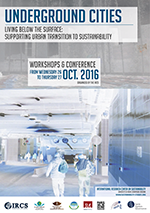 The theme of these sixth Rencontres de Reims in sustainability studies was the “Underground Cities”. This event had taken place on Wednesday 26 and Thursday, October 27, 2016 in Reims (City Hall of Reims). The sixth edition of the Rencontres Internationales de Reims on Sustainability Science addressed the habitability of underground spaces, and how they can contribute to successful urban transitions to sustainability. [read more…]
The theme of these sixth Rencontres de Reims in sustainability studies was the “Underground Cities”. This event had taken place on Wednesday 26 and Thursday, October 27, 2016 in Reims (City Hall of Reims). The sixth edition of the Rencontres Internationales de Reims on Sustainability Science addressed the habitability of underground spaces, and how they can contribute to successful urban transitions to sustainability. [read more…]Rencontres 2015 – Urban Agriculture: Fostering the Urban-Rural Continuum
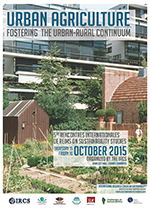 Urban sustainability should be inclusive, in the sense that it should address sustainability in an area large enough to encompass urban centers, but suburban, periurban and dependent rural, or natural places. There is an urban arrangement that can address this urban-rural continuum while deeply transforming urban systems conditions to foster a more sustainable future: Urban agriculture. Urban agriculture postulates that some type of agriculture may flourish within the city. It considers that urban multifunctionality should also include farming. As a matter of fact, Urban agriculture is not such a fresh idea. It existed for centuries in very different places around the world, such as the chinampas in Tenochtitlan — the actual Mexico city — since the 15th century or sooner, the hortillonnages in Amiens — a French city north of Paris — for more than twenty centuries, or the interstitial gardens (agriculture d’interstice) of Yaoundé — Cameroon’s capital — which accompanied the foundation of the city in the 19th century.[read more…]
Urban sustainability should be inclusive, in the sense that it should address sustainability in an area large enough to encompass urban centers, but suburban, periurban and dependent rural, or natural places. There is an urban arrangement that can address this urban-rural continuum while deeply transforming urban systems conditions to foster a more sustainable future: Urban agriculture. Urban agriculture postulates that some type of agriculture may flourish within the city. It considers that urban multifunctionality should also include farming. As a matter of fact, Urban agriculture is not such a fresh idea. It existed for centuries in very different places around the world, such as the chinampas in Tenochtitlan — the actual Mexico city — since the 15th century or sooner, the hortillonnages in Amiens — a French city north of Paris — for more than twenty centuries, or the interstitial gardens (agriculture d’interstice) of Yaoundé — Cameroon’s capital — which accompanied the foundation of the city in the 19th century.[read more…]
Rencontres 2014 – Urban Transitions to Sustainability
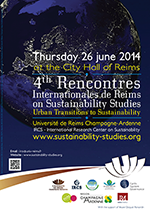
The theme of this 4th edition of the International Rencontres de Reims in Sustainability Studies was ‘Urban Transitions to Sustainability’.
Nearly 70% of the world population lives in urban areas and nearly 75% of economic activity is located therein. Urban areas concentrate not only wealth but also extreme poverty and environmental degradation. Despite the significant progress in urbanization, still a billion people live in the slums of urban areas. The issue of urban transitions to sustainability is a major challenge. In Europe, the 2007 Leipzig Charter puts “sustainable cities” on top of the agenda for sustainability. Two years later, the situation report of the European Commission on the European Union Sustainable Development Strategy considers the issue of “Sustainable Cities” as a major axis.[read more…]
Rencontres 2013 – Post-2015 Sustainable Development Goals: Towards a New Social Contract
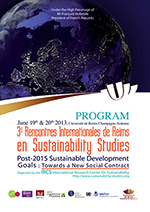 In 2013, the United Nations will take stock of the Millennium Development Goals (MDG). It is inevitable that the question of what to do next will be asked. What to do after the expiry of the MDG in 2015? The goal of the Third Rencontres Internationales de Reims in Sustainability Studies is to contribute to this debate, to produce some elements to answer to this question about sustainability. Particular attention will be paid to environmental governance, regional development and social justice.
In 2013, the United Nations will take stock of the Millennium Development Goals (MDG). It is inevitable that the question of what to do next will be asked. What to do after the expiry of the MDG in 2015? The goal of the Third Rencontres Internationales de Reims in Sustainability Studies is to contribute to this debate, to produce some elements to answer to this question about sustainability. Particular attention will be paid to environmental governance, regional development and social justice.
The Millennium Declaration proclaimed the “collective responsibility to uphold the principles of human dignity, equality and equity at the global level” . Of course, but how to go beyond lip service and do it concretely? More precisely, how to take into consideration new global phenomena such as and of the dimension of climate change, the depletion of natural resources, financial crises, demographic dynamics, migrations and mobility.[read more…]
Rencontres 2012 – After Rio+20, when planning becomes democratic
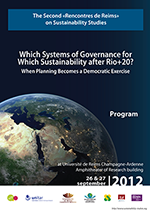
This year’s Rio Conference on Sustainable Development echoes the summit that took place in 1992. It is entitled “Rio+20”, as if a simple and direct line connected 1992 to 2012. In twenty years, however, the world has changed a lot. It became globalized and the centers of production of wealth have shifted. Today, the economic and political rise of emerging countries takes place against the backdrop of a four-fold environmental, social, financial and political crisis among old industrial countries. This phenomenon goes hand in hand with a growing gap in wealth and increasing asymmetries between the capability of actors and populations from local communities to the whole planet.[read more…]
Rencontres 2011 – Social Justice and Sustainability: Back to Planning?
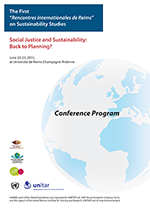 These first “rencontres” marked the launching of the Research Center for Sustainability Science in Reims. Sustainability Science—that can hardly be translated into French—represents an emerging discipline [http://m.pnas.org/content/104/6/1737]. Its formal birth dates back to the 2001 Amsterdam Conference Challenges of a Changing Earth. Sustainability science addresses action on sustainable development. This presupposes a multiscale approach—temporal, spatial, and functional—, as well the inclusion of dynamic equilibria, not only of an economic, physical-chemical or biological kind, but also between actors and societies whose interests may be divergent. It correspond to use-inspired research, which is based on the postulate that the greatest scientific achievements in whatever domain take place in the framework of research applied to concrete needs of human societies. This research is, therefore, at the same time “basic” and “applied”. It is about science (natural and social) and technology for sustainability.[read more…]
These first “rencontres” marked the launching of the Research Center for Sustainability Science in Reims. Sustainability Science—that can hardly be translated into French—represents an emerging discipline [http://m.pnas.org/content/104/6/1737]. Its formal birth dates back to the 2001 Amsterdam Conference Challenges of a Changing Earth. Sustainability science addresses action on sustainable development. This presupposes a multiscale approach—temporal, spatial, and functional—, as well the inclusion of dynamic equilibria, not only of an economic, physical-chemical or biological kind, but also between actors and societies whose interests may be divergent. It correspond to use-inspired research, which is based on the postulate that the greatest scientific achievements in whatever domain take place in the framework of research applied to concrete needs of human societies. This research is, therefore, at the same time “basic” and “applied”. It is about science (natural and social) and technology for sustainability.[read more…]

